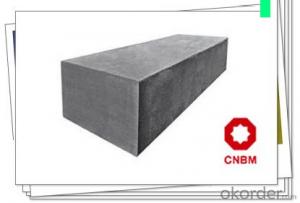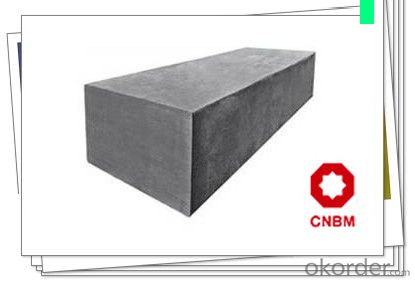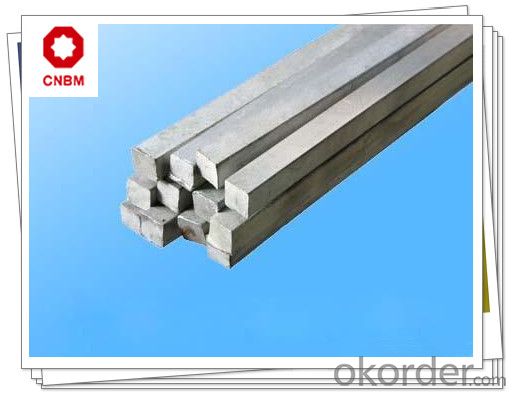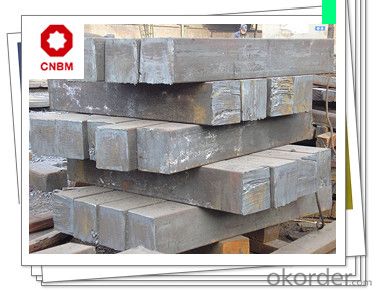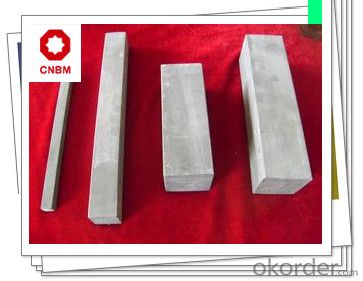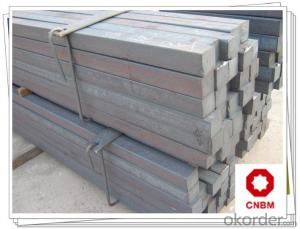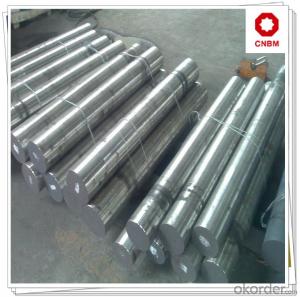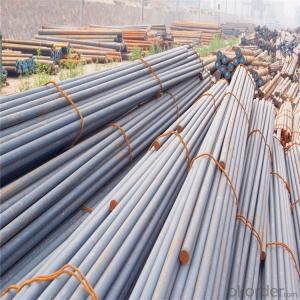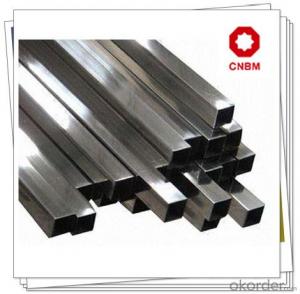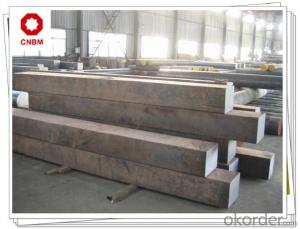Carbon Structural Steel Square Bars SAE1020CR
- Loading Port:
- Shanghai
- Payment Terms:
- TT OR LC
- Min Order Qty:
- 25 m.t.
- Supply Capability:
- 120000 m.t./month
OKorder Service Pledge
OKorder Financial Service
You Might Also Like
Carbon Structural Steel Square Bars SAE1020CR
Product Specification
1, Chemical Composition %
| Grade | C | Si | Mn | S | P | Cr | Ni | Cu |
| SAE1020CR | 0.17-0.24 | 0.17-0.37 | 0.35-0.65 | ≤0.035 | ≤0.035 | ≤0.25 | ≤0.25 | ≤0.25 |
2, Mechanical Properties
| Strength of Extension σb | Yield Strength σs | Elogation δ5 | Reduction of Area ψ | Hardness (no heat treatment) |
| ≥410(42) Mpa | ≥245(25) Mpa | ≥25 % | ≥55 % | ≤156HB |
Application
1, can be used to produce various types of rivet, bolts and welding structural parts.
2, can be used to produce seamless pipes, mold, steel plate, U-steel and joist steel
Product Main Points
1, high quality with competitive price
2, certifictes are available
3, heat treatment specification: tempering, 910 ℃, air cooling
4, heat treat ment: normalizing, annealing, tempering, quenching
5, surface treatment: black, polished, galvanized
6, hot rolled, cold drawn, forged
FAQ
1, Payment Terms:
30% T/T deposit & 70% T/T before delivery.
Irrevocable L/C at sight
2, Trade Terms:
EXW, FOB, CIF, CNF
3, Delivery Time:
Normally 30-40 days. According to quantity.
4, Manufacture or Trading Company:
CNBM is a state-owned fortune global 500 trading company. We have intergrated supply system.
There are about 20 overseas locations in different countries.
Product Show
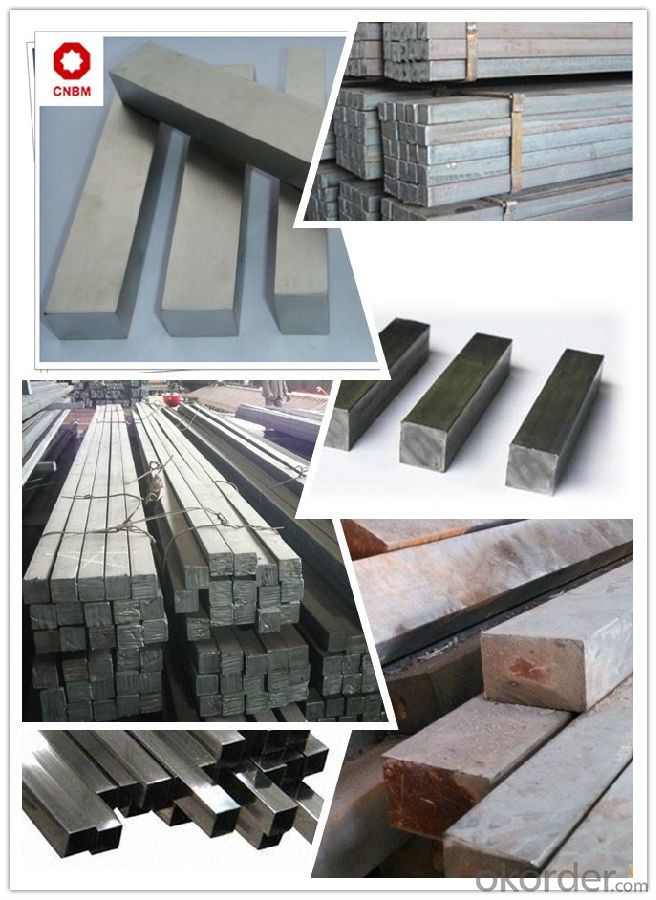
Work Shop
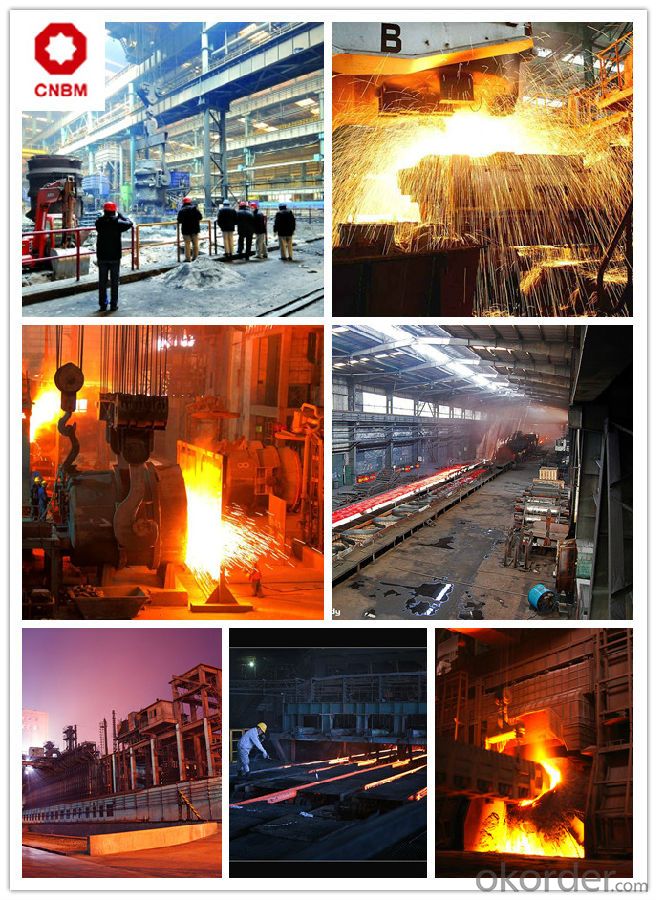
About Us

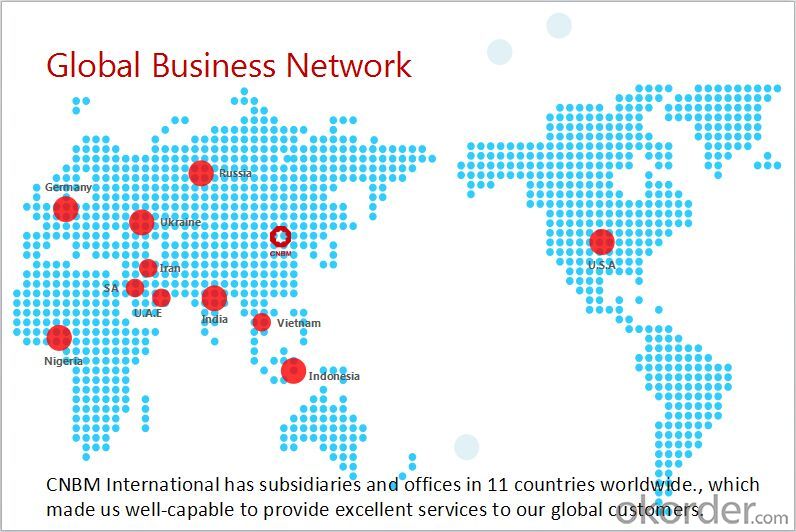
- Q: Can steel round bars be used in food processing applications?
- No, steel round bars are not suitable for food processing applications as they can corrode and contaminate the food. Stainless steel is typically used in such applications due to its corrosion resistance and hygienic properties.
- Q: What are the advantages of using magnesium-alloy steel round bars?
- Using magnesium-alloy steel round bars offers several benefits: 1. They are lightweight, making them ideal for industries that require weight reduction, such as aerospace and automotive. 2. Despite being lightweight, they have a high strength-to-weight ratio, ensuring structural integrity under high loads. 3. They have excellent corrosion resistance, making them suitable for outdoor and marine applications. 4. They are known for their superior machinability, allowing for precise and complex component manufacturing. 5. They effectively dissipate heat, making them ideal for applications that require heat management. 6. They contribute to a more sustainable and environmentally friendly manufacturing process due to magnesium's recyclability. 7. While they may have a higher initial cost, their lightweight nature leads to cost savings in transportation and installation. Additionally, their corrosion resistance and durability reduce long-term maintenance and replacement costs. In conclusion, magnesium-alloy steel round bars offer advantages such as lightweight, high strength-to-weight ratio, corrosion resistance, machinability, heat dissipation, eco-friendliness, and cost-effectiveness. They are highly desirable for industries that prioritize weight reduction, performance, and durability.
- Q: Is round steel bar round steel?
- Yes.From the shape of points for the light round steel, crescent steel, rebar.From the strength of reinforcement is divided into one level (235), two (335), three (435), four (435)Cold drawn from the production process (first tensioning and long pull method), cold and so on
- Q: Can steel round bars be used in the hydraulic industry?
- Certainly, the hydraulic industry can make use of steel round bars. Renowned for their robustness, endurance, and immunity to corrosion, steel round bars prove to be ideal for a wide range of applications within the hydraulic industry. They find utility in the production of hydraulic cylinders, pistons, and other components necessitating exceptional tensile strength and dependability. Moreover, steel round bars can be conveniently machined and fashioned into diverse dimensions and specifications, ensuring they align with the precise requirements of hydraulic systems. In essence, owing to their exceptional mechanical characteristics and adaptability, steel round bars remain a favored choice in the hydraulic industry.
- Q: What are the different types of steel round bars used in the automotive steering systems?
- In automotive steering systems, there exists a range of steel round bars with distinctive properties and advantages. 1. Carbon Steel Round Bars: These round bars are extensively utilized in automotive steering systems due to their superior strength and durability. They are suitable for various steering components like tie rods and drag links. Additionally, carbon steel round bars are cost-effective and readily accessible, making them a popular choice in the automotive industry. 2. Alloy Steel Round Bars: By incorporating alloying elements such as chromium, nickel, and molybdenum into carbon steel, alloy steel round bars enhance their strength, hardness, and wear resistance. They are particularly useful in high-stress areas of the steering system, including steering shafts and steering knuckles, where additional strength is required. 3. Stainless Steel Round Bars: Stainless steel round bars are renowned for their exceptional resistance to corrosion, making them ideal for steering components exposed to harsh environments or moisture. Steering column shafts and tie rod ends frequently incorporate stainless steel round bars. 4. Tool Steel Round Bars: Steering system components that demand high hardness, wear resistance, and toughness often utilize tool steel round bars. These bars are commonly employed in the production of steering gears and other precision steering components. 5. High-Strength Low-Alloy (HSLA) Steel Round Bars: HSLA steel round bars, a type of alloy steel, offer a favorable balance between strength, toughness, and formability. Lightweight steering system components often employ HSLA steel round bars to reduce weight while maintaining structural integrity. Ultimately, the selection of steel round bars in automotive steering systems depends on factors such as the specific application, desired strength, durability, and corrosion resistance. Manufacturers carefully choose the appropriate steel type to ensure optimal performance and safety in steering systems.
- Q: What is the maximum hardness achievable for steel round bars?
- The maximum hardness achievable for steel round bars depends on various factors such as the composition of the steel, the heat treatment process, and the desired properties for the specific application. Generally, steel can achieve a maximum hardness of around 65 HRC (Rockwell Hardness Scale C) or higher. This level of hardness is typically obtained through processes like quenching and tempering. Quenching involves rapidly cooling the steel from a high temperature to room temperature, which results in a hardened structure. Tempering is then performed to reduce the brittleness and improve the toughness of the steel while maintaining a high level of hardness. It's important to note that increasing the hardness of steel beyond a certain point may lead to reduced toughness and increased brittleness. Therefore, the maximum achievable hardness should be balanced with the desired properties for the specific application, such as strength, ductility, and resistance to wear or impact.
- Q: Can steel round bars be used in the telecommunications industry?
- Yes, steel round bars can be used in the telecommunications industry. Steel round bars are commonly used to provide structural support for various telecommunications equipment such as antennas, satellite dishes, and communication towers. These bars are highly durable and can withstand harsh weather conditions, making them suitable for outdoor installations. Additionally, steel round bars can be easily fabricated and shaped to meet specific design requirements, allowing for the integration of various components in the telecommunications infrastructure.
- Q: What is the difference between a rough turned and a centerless ground steel round bar?
- A rough turned steel round bar is a steel bar that has been machined to a standard size and shape using a lathe or turning machine. This involves removing excess material from the bar's surface to achieve the desired diameter and smoothness. The resulting rough turned bar may still have minor imperfections or variations in size and surface finish. On the contrary, a centerless ground steel round bar undergoes a different manufacturing process. This process involves feeding the steel bar through two rotating wheels - a grinding wheel and a regulating wheel. The grinding wheel removes material from the bar's surface to achieve a precise diameter, while the regulating wheel controls the bar's feed rate. This process ensures precise tolerances, an excellent surface finish, and a consistent diameter along the entire length of the bar. In conclusion, the primary distinction between a rough turned and a centerless ground steel round bar lies in the manufacturing process and resulting quality. While a rough turned bar is machined to a standard size and shape with some imperfections, a centerless ground bar undergoes a more precise grinding process to achieve a highly accurate diameter, excellent surface finish, and consistent dimensions throughout the bar.
- Q: Can steel round bars be used for making punches and dies?
- Yes, steel round bars can be used for making punches and dies. Steel round bars are commonly used in tool and die making due to their high strength and durability. They can be machined or forged into the desired shape and then hardened to ensure a long lifespan and resistance to wear and deformation. The hardness and toughness of steel round bars make them ideal materials for withstanding the high forces and pressures involved in punching and shaping various materials. Additionally, steel round bars are readily available in various sizes and grades, making them a cost-effective choice for making punches and dies.
- Q: Can steel round bars be used for making storage tanks?
- Yes, steel round bars can be used for making storage tanks. Steel is a strong and durable material that is commonly used in the construction of storage tanks due to its high tensile strength and resistance to corrosion. Steel round bars can be shaped and welded together to form the structure of the tank, providing stability and support. Additionally, steel tanks can be customized to meet specific storage requirements, making them a versatile choice for various industries.
Send your message to us
Carbon Structural Steel Square Bars SAE1020CR
- Loading Port:
- Shanghai
- Payment Terms:
- TT OR LC
- Min Order Qty:
- 25 m.t.
- Supply Capability:
- 120000 m.t./month
OKorder Service Pledge
OKorder Financial Service
Similar products
Hot products
Hot Searches
Related keywords
